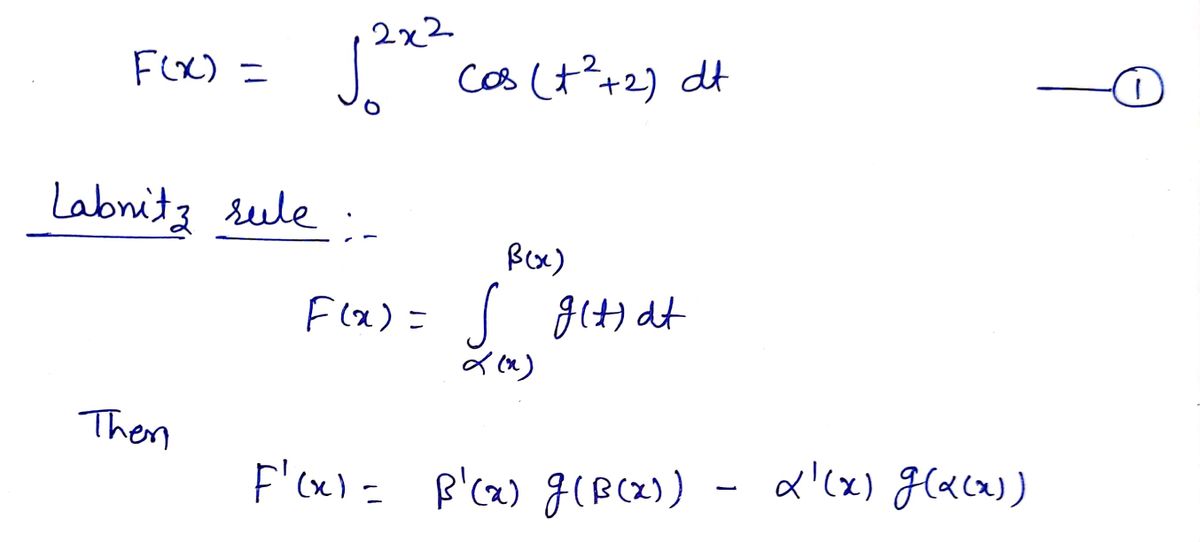2x² Find F'(x) given that F(x) = S," cos (t2 + 2)dt
Advanced Engineering Mathematics
10th Edition
ISBN:9780470458365
Author:Erwin Kreyszig
Publisher:Erwin Kreyszig
Chapter2: Second-order Linear Odes
Section: Chapter Questions
Problem 1RQ
Related questions
Topic Video
Question
100%
![**Problem Statement:**
Find \( F'(x) \) given that
\[ F(x) = \int_{0}^{2x^2} \cos(t^2 + 2) \, dt \]
**Explanation:**
This problem involves finding the derivative of a function defined by an integral using the Fundamental Theorem of Calculus. The function \( F(x) \) is an integral with a variable upper limit, \( 2x^2 \). To find the derivative \( F'(x) \), apply the following process:
1. **Recognize the Form**: The function is of the form \( F(x) = \int_{a}^{g(x)} f(t) \, dt \).
2. **Use the Fundamental Theorem of Calculus**: If \( F(x) = \int_{a}^{g(x)} f(t) \, dt \), then the derivative is \( F'(x) = f(g(x)) \cdot g'(x) \).
3. **Apply the Derivative**:
- Here, \( f(t) = \cos(t^2 + 2) \).
- \( g(x) = 2x^2 \), so \( g'(x) = \frac{d}{dx}(2x^2) = 4x \).
4. **Substitute and Simplify**:
- \( F'(x) = \cos((2x^2)^2 + 2) \cdot 4x \).
- Simplify the expression inside the cosine: \( (2x^2)^2 = 4x^4 \).
- Therefore, \( F'(x) = \cos(4x^4 + 2) \cdot 4x \).
This solution uses calculus principles to handle the differentiation of an integral with a variable upper limit effectively.](/v2/_next/image?url=https%3A%2F%2Fcontent.bartleby.com%2Fqna-images%2Fquestion%2F01a138b1-4237-4983-ac1d-3a78af50f30a%2F0b4a4bfb-bbef-4778-8d3e-80292d4a338f%2Fn0cux88_processed.png&w=3840&q=75)
Transcribed Image Text:**Problem Statement:**
Find \( F'(x) \) given that
\[ F(x) = \int_{0}^{2x^2} \cos(t^2 + 2) \, dt \]
**Explanation:**
This problem involves finding the derivative of a function defined by an integral using the Fundamental Theorem of Calculus. The function \( F(x) \) is an integral with a variable upper limit, \( 2x^2 \). To find the derivative \( F'(x) \), apply the following process:
1. **Recognize the Form**: The function is of the form \( F(x) = \int_{a}^{g(x)} f(t) \, dt \).
2. **Use the Fundamental Theorem of Calculus**: If \( F(x) = \int_{a}^{g(x)} f(t) \, dt \), then the derivative is \( F'(x) = f(g(x)) \cdot g'(x) \).
3. **Apply the Derivative**:
- Here, \( f(t) = \cos(t^2 + 2) \).
- \( g(x) = 2x^2 \), so \( g'(x) = \frac{d}{dx}(2x^2) = 4x \).
4. **Substitute and Simplify**:
- \( F'(x) = \cos((2x^2)^2 + 2) \cdot 4x \).
- Simplify the expression inside the cosine: \( (2x^2)^2 = 4x^4 \).
- Therefore, \( F'(x) = \cos(4x^4 + 2) \cdot 4x \).
This solution uses calculus principles to handle the differentiation of an integral with a variable upper limit effectively.
Expert Solution
Step 1

Step by step
Solved in 2 steps with 2 images

Knowledge Booster
Learn more about
Need a deep-dive on the concept behind this application? Look no further. Learn more about this topic, advanced-math and related others by exploring similar questions and additional content below.Recommended textbooks for you

Advanced Engineering Mathematics
Advanced Math
ISBN:
9780470458365
Author:
Erwin Kreyszig
Publisher:
Wiley, John & Sons, Incorporated

Numerical Methods for Engineers
Advanced Math
ISBN:
9780073397924
Author:
Steven C. Chapra Dr., Raymond P. Canale
Publisher:
McGraw-Hill Education

Introductory Mathematics for Engineering Applicat…
Advanced Math
ISBN:
9781118141809
Author:
Nathan Klingbeil
Publisher:
WILEY

Advanced Engineering Mathematics
Advanced Math
ISBN:
9780470458365
Author:
Erwin Kreyszig
Publisher:
Wiley, John & Sons, Incorporated

Numerical Methods for Engineers
Advanced Math
ISBN:
9780073397924
Author:
Steven C. Chapra Dr., Raymond P. Canale
Publisher:
McGraw-Hill Education

Introductory Mathematics for Engineering Applicat…
Advanced Math
ISBN:
9781118141809
Author:
Nathan Klingbeil
Publisher:
WILEY

Mathematics For Machine Technology
Advanced Math
ISBN:
9781337798310
Author:
Peterson, John.
Publisher:
Cengage Learning,

